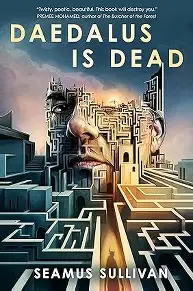Seamus Sullivan’s Daedalus is Dead is a book that wears its mythological heart on its sleeve while keeping its narrative ambitions grounded in the human. At first glance, the title evokes the classical myth of Daedalus, the ingenious craftsman who built the Labyrinth. He also fashioned wings for himself and for his son, Icarus. But the novel is not simply a retelling. So, let’s talk about it.
Daedalus Is Dead is an inventive literary work that blends elements of speculative fiction and character-driven drama into a tightly coiled narrative about ambition and the costs of escape – physical, moral, and emotional. What makes Sullivan’s approach compelling is the refusal to be hemmed in by expectations of the mythological fiction genre. This is not “mythology in a modern dress”.
Sullivan uses the character of Daedalus as a thematic touchstone. He is a problem-solver who can build anything except a way out of his own guilt. The setting and characters have a familiar specificity that makes them feel alive rather than symbolic. Daedalus Is Dead is a world of crumbling infrastructure and an almost dreamlike strangeness.
Sullivan’s prose is striking and lyrical, almost poetic. The characterization is equally strong. Daedalus himself is not a heroic genius or a hapless victim. He is deeply flawed, a person whose intelligence and resourcefulness are matched by his regrets. Allies and antagonists are written in a way that feels seamless to the story’s momentum.
Daedalus Is Dead is also dripping with heavy themes of fatherhood and the inevitable shortcomings and oversights that comes with that responsibility. If you are familiar with the story of Daedalus, the Minotaur and Icarus, it is easy to see why Daedalus is such a tortured soul. He asks himself how far he can go to get back what he lost and perhaps make up for some of the horrors he feels responsible for. It is a stark and unflinching look at how one sees themselves when they have had a hand in the horrific.

Thematically, the book is rich. It engages with questions of agency and the slippery ethics of problem-solving when the problem in itself, is unjust or simply wrong. The world of Deadalus Is Dead is one where cleverness can be both a salvation and a downfall. Where the line between creation and destruction is perilously thin.
Sullivan demonstrates his skill as the story does not rush nor deliver non-stop action, but, when the tension does spike, it does so with purpose. The more perilous scenes have a kinetic urgency, driven by character decisions and external peril. The ending does avoid a tidy resolution because this would betray the novel’s complexity. It lands with emotional weight. Sullivan does not always spell things out for the us and for readers who appreciate fiction that trusts them to make connections and sit with ambiguity, this will be one of the novels greatest strenghts. Paul Tremblay, anyone? The king of ambiguity.
Ultimately, Daedalus Is Dead succeeds because it respects its mythic roots and realism anyone can relate to. It is a novel that recognizes the enduring power of the Deadalus archetype – the master craftsman and problem-solver, an escape artist, the man who builds his own prison – while grounding those ideas in a vividly drawn, morally complex world. Sullivan’s prose is sharp, his characters nuanced and his thematic explorations both timeless and unique.
For readers drawn to intelligent and layered fiction that merges the personal with the allegorical, Daedalus is Dead is well worth the read. It’s a story that leaves images and ideas in your head that resurface even after reading, like the echo of wings beating against the sky.
Sullivan has given us a compelling, atmospheric novel that blends mythic resonance with gritty human struggles. It is as much about the labyrinths we built within ourselves as it is about finding a way out. Sullivan has proven himself as a writer of considerable skill and ambition. Daedalus Is Dead went on sale September 30th, 2025, from TorDotCom, an imprint of Macmillan Publishing and you do not want to miss this tale.
—
Seamus Sullivan’s fiction has appeared in Terraform and his book reviews have appeared in Strange Horizons. He lives in Jersey City with his family. Daedalus is Dead is his first novel.
Images Courtesy of Tor.com
Have strong thoughts about this piece you need to share? Or maybe there’s something else on your mind you’re wanting to talk about with fellow Fandomentals? Head on over to our Community server to join in the conversation!

